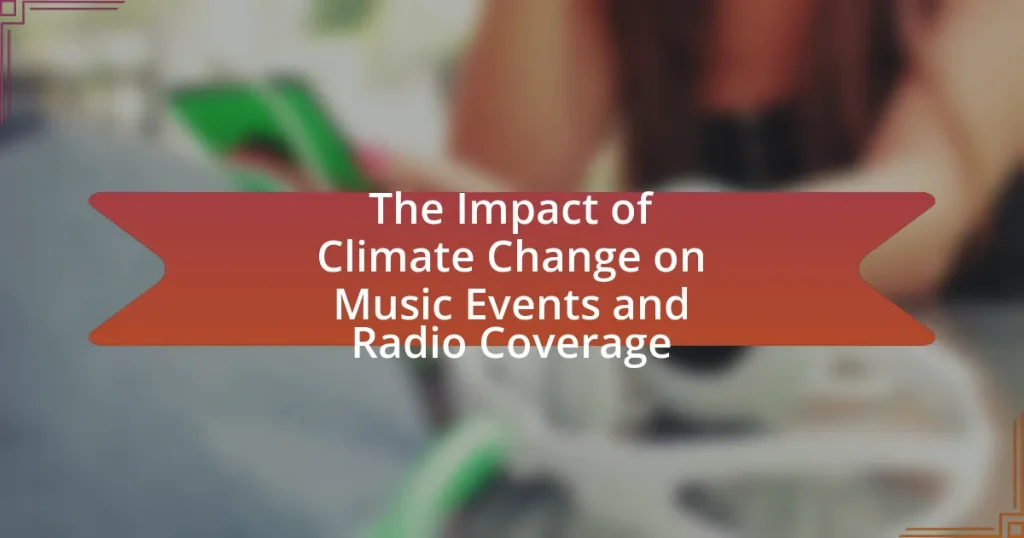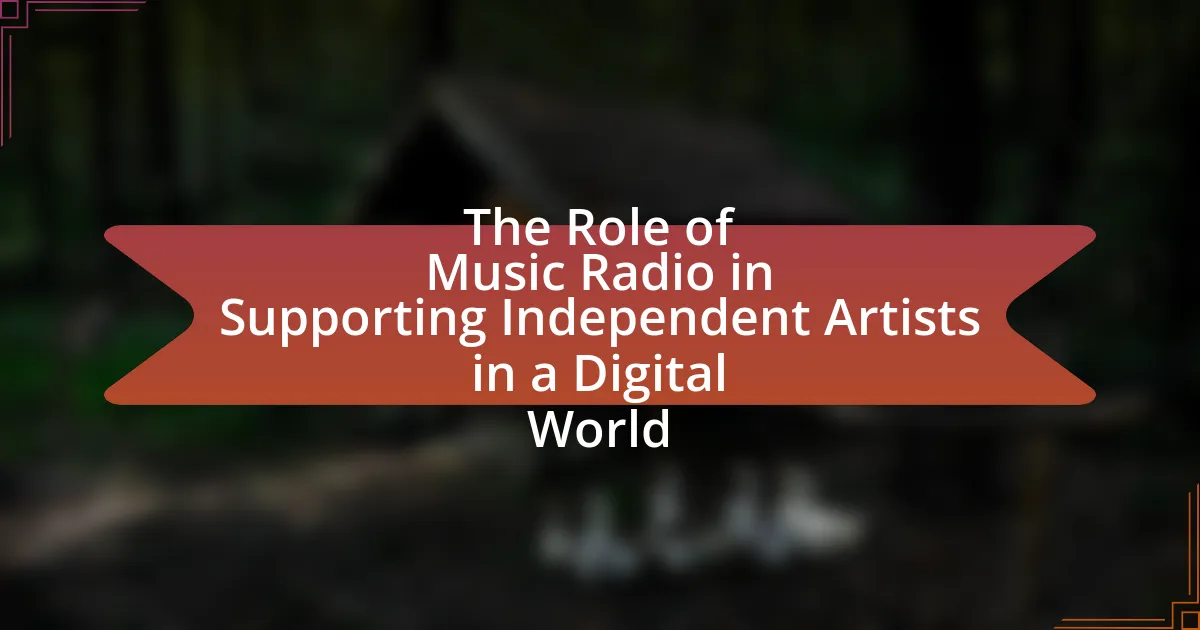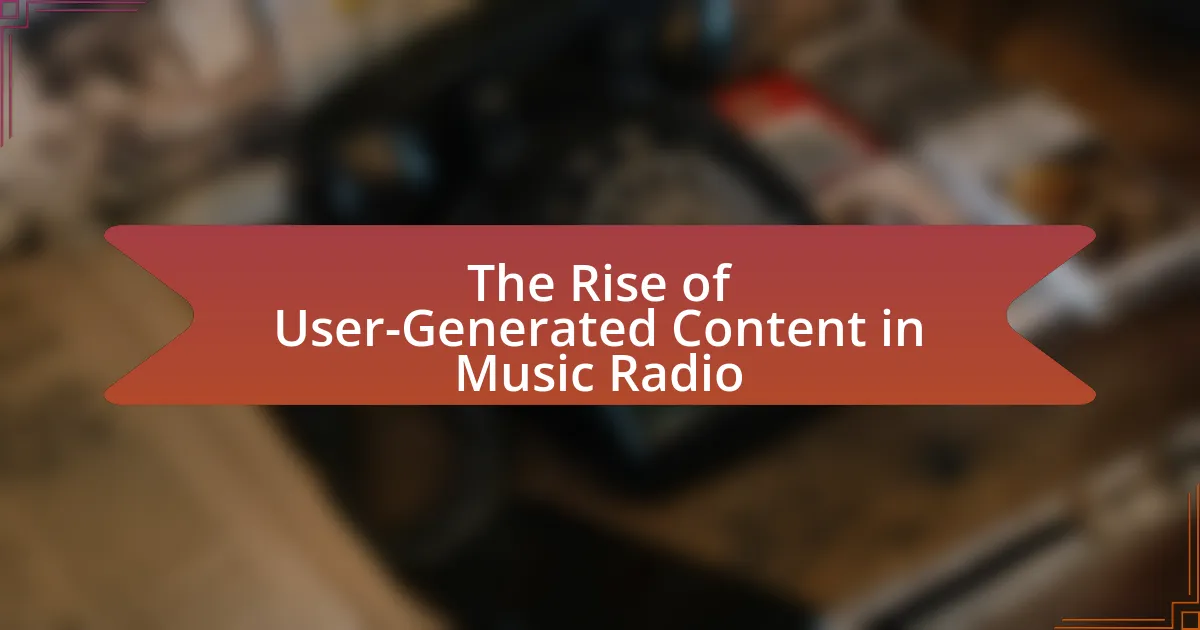The article examines the significant impact of climate change on music events and radio coverage, highlighting how altered weather patterns and increased extreme weather events disrupt outdoor festivals and broadcasting capabilities. It discusses the logistical challenges faced by event organizers, including cancellations and safety concerns, as well as the implications for audience attendance and demographic shifts. Additionally, the article explores the sustainability practices being adopted by music events and the role of radio stations in adapting their coverage strategies to address climate-related issues, emphasizing the need for environmentally responsible practices in the music industry.
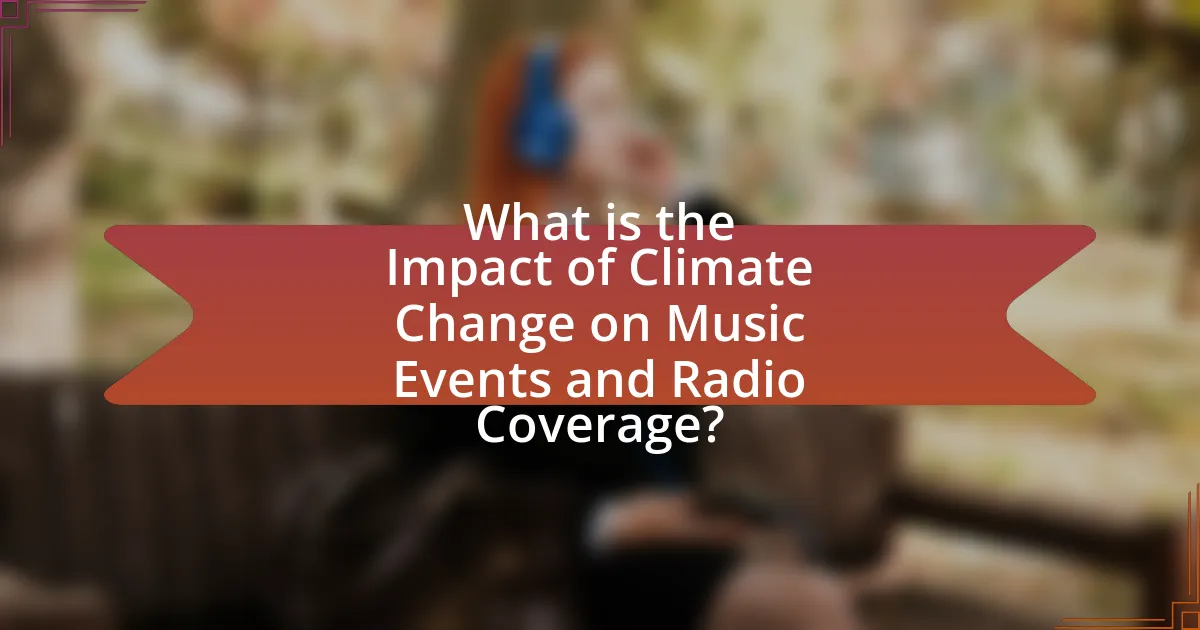
What is the Impact of Climate Change on Music Events and Radio Coverage?
Climate change significantly impacts music events and radio coverage by altering weather patterns and increasing the frequency of extreme weather events. For instance, festivals may face cancellations or relocations due to severe storms, heatwaves, or flooding, which disrupts attendance and logistics. Additionally, radio stations may experience challenges in broadcasting live events due to technical difficulties caused by adverse weather conditions. A study by the National Oceanic and Atmospheric Administration (NOAA) indicates that climate-related disruptions have increased by 30% over the past decade, highlighting the growing vulnerability of outdoor music events and the associated media coverage.
How does climate change affect the organization of music events?
Climate change significantly affects the organization of music events by altering weather patterns, which can lead to increased cancellations and logistical challenges. For instance, extreme weather events such as storms, heatwaves, and flooding can disrupt outdoor festivals, forcing organizers to reconsider locations, dates, and safety measures. According to a report by the United Nations Environment Programme, climate-related disruptions have increased by 50% over the past decade, impacting event planning and execution. Additionally, rising temperatures may necessitate changes in infrastructure, such as enhanced cooling systems or shaded areas, to ensure the comfort and safety of attendees.
What specific weather-related challenges do music events face due to climate change?
Music events face specific weather-related challenges due to climate change, including increased frequency of extreme weather events, rising temperatures, and unpredictable precipitation patterns. These challenges can lead to event cancellations, safety hazards for attendees and performers, and damage to equipment and infrastructure. For instance, a study by the National Oceanic and Atmospheric Administration (NOAA) indicates that the number of extreme weather events has increased by 30% over the past few decades, directly impacting outdoor music festivals. Additionally, rising temperatures can create uncomfortable conditions for both audiences and performers, potentially reducing attendance and overall enjoyment. Unpredictable rainfall can lead to muddy grounds, posing risks for equipment and creating logistical difficulties.
How do changes in climate influence the scheduling and location of music events?
Changes in climate significantly influence the scheduling and location of music events by altering weather patterns and increasing the frequency of extreme weather events. For instance, rising temperatures can lead to heatwaves, prompting organizers to schedule outdoor events during cooler times of the day or move them indoors. Additionally, increased rainfall and storms can force cancellations or relocations, as seen in festivals like Coachella, which has adjusted its dates in response to climate-related concerns. According to a study published in the journal “Global Environmental Change,” 70% of event organizers reported that climate change has affected their planning decisions, highlighting the growing impact of environmental factors on the music industry.
What are the implications of climate change for audience attendance at music events?
Climate change negatively impacts audience attendance at music events by increasing the frequency of extreme weather events, which can deter people from attending. For instance, rising temperatures, heavy rainfall, and severe storms can lead to event cancellations or reduced turnout, as seen in festivals like Coachella, where heat advisories have affected attendance numbers. Additionally, changing climate patterns may force event organizers to alter locations or dates, further complicating audience participation. Studies indicate that 70% of festival-goers express concerns about climate-related disruptions, highlighting a significant shift in audience behavior due to environmental factors.
How does extreme weather impact audience turnout and safety at events?
Extreme weather significantly reduces audience turnout and compromises safety at events. For instance, severe storms, heavy rainfall, or extreme heat can deter attendees from traveling to venues, leading to lower participation rates. According to a study by the National Oceanic and Atmospheric Administration, events held during extreme weather conditions can see attendance drop by as much as 30% compared to similar events in favorable weather. Additionally, safety concerns arise as extreme weather can create hazardous conditions, such as flooding or heat-related illnesses, prompting event organizers to implement emergency protocols or even cancel events altogether. This correlation between extreme weather and audience turnout is evident in various case studies, including the cancellation of outdoor festivals during hurricanes, which underscores the critical impact of climate conditions on event dynamics.
What demographic shifts might occur in attendance due to climate-related factors?
Climate-related factors may lead to demographic shifts in attendance at music events, particularly as extreme weather events and changing climate conditions affect accessibility and safety. For instance, increased frequency of heatwaves, flooding, and storms can deter attendance from vulnerable populations, such as the elderly and those with health issues, while younger demographics may be more inclined to attend events despite adverse conditions. Additionally, urban migration patterns influenced by climate change may shift attendance from rural to urban areas, as people relocate to cities perceived as safer or more resilient to climate impacts. Research indicates that events in regions experiencing severe climate impacts may see a decline in local attendees, while those in more stable climates could attract larger crowds, reflecting a shift in demographic engagement based on environmental conditions.
How does climate change affect the sustainability of music events?
Climate change significantly affects the sustainability of music events by increasing the frequency of extreme weather conditions, which can disrupt planning and attendance. For instance, rising temperatures and unpredictable rainfall can lead to event cancellations or reduced participation, as seen in festivals like Coachella, which faced heat-related health concerns. Additionally, the carbon footprint of large-scale music events contributes to climate change, creating a cycle that threatens their long-term viability. According to a study by the University of California, music festivals can generate up to 1,000 tons of carbon emissions, highlighting the urgent need for sustainable practices in the industry.
What practices can be adopted to make music events more environmentally friendly?
To make music events more environmentally friendly, organizers can implement practices such as using renewable energy sources, reducing waste through recycling and composting, and promoting sustainable transportation options for attendees. Utilizing renewable energy, like solar or wind power, can significantly lower the carbon footprint of events; for instance, the Coachella Valley Music and Arts Festival has successfully integrated solar panels to power stages. Reducing waste can be achieved by providing recycling bins and encouraging the use of biodegradable materials, as seen in events like Glastonbury, which aims for zero waste. Additionally, promoting public transport, carpooling, or bike-sharing can minimize emissions from travel, as demonstrated by festivals that offer incentives for attendees who use eco-friendly transportation methods.
How do music festivals contribute to climate change, and what can be done to mitigate this?
Music festivals contribute to climate change primarily through significant greenhouse gas emissions generated by transportation, energy consumption, and waste production. For instance, a study by the University of California, Berkeley, found that large festivals can produce over 1,000 tons of CO2 emissions, largely from attendees traveling to the event and the energy used for stages and lighting. To mitigate this impact, organizers can implement strategies such as promoting public transportation, utilizing renewable energy sources, and enhancing waste management practices, including recycling and composting. These measures can substantially reduce the carbon footprint associated with music festivals.
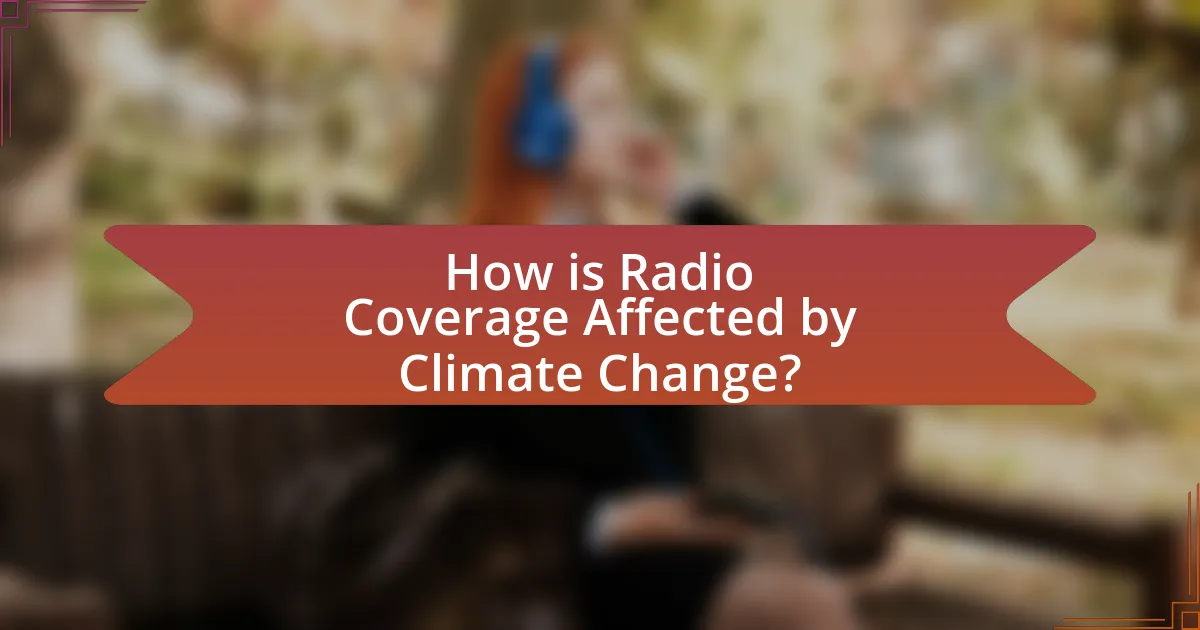
How is Radio Coverage Affected by Climate Change?
Climate change negatively affects radio coverage by altering atmospheric conditions that influence signal propagation. Increased humidity and temperature variations can lead to changes in the ionosphere, which is crucial for long-distance radio communication. For instance, studies have shown that higher temperatures can increase the likelihood of signal attenuation and interference, reducing the effective range of radio broadcasts. Additionally, extreme weather events, such as storms and heavy rainfall, can physically damage transmission infrastructure, further impairing radio coverage.
What challenges do radio stations face in covering music events impacted by climate change?
Radio stations face significant challenges in covering music events impacted by climate change, primarily due to logistical disruptions and safety concerns. Extreme weather events, such as hurricanes and wildfires, can lead to event cancellations or relocations, making it difficult for radio stations to provide timely coverage. Additionally, the need for enhanced safety measures for staff and equipment during such events can strain resources and complicate reporting efforts. According to a report by the National Oceanic and Atmospheric Administration, the frequency of extreme weather events has increased by 40% over the past few decades, highlighting the growing impact of climate change on public events. This trend necessitates that radio stations adapt their coverage strategies to ensure accurate and safe reporting.
How does climate change disrupt broadcasting capabilities during events?
Climate change disrupts broadcasting capabilities during events primarily through extreme weather conditions, which can damage infrastructure and hinder signal transmission. For instance, hurricanes, floods, and wildfires can physically destroy broadcasting towers and equipment, leading to service outages. According to the National Oceanic and Atmospheric Administration (NOAA), the frequency of severe weather events has increased by 40% over the past few decades, directly impacting the reliability of broadcasting during critical events. Additionally, rising temperatures can affect the performance of electronic equipment, causing overheating and malfunctions, further complicating live broadcasts.
What are the implications for content creation and reporting on climate-related issues in music?
Content creation and reporting on climate-related issues in music necessitate a heightened awareness of environmental impacts and a commitment to sustainability. Musicians and content creators are increasingly expected to address climate change in their work, influencing themes, lyrics, and promotional strategies. For instance, artists like Billie Eilish have incorporated environmental messages into their music and public personas, reflecting a growing trend where climate advocacy becomes integral to artistic expression. This shift not only resonates with audiences but also aligns with the broader cultural movement towards sustainability, as evidenced by the rise of eco-conscious music festivals that prioritize carbon neutrality and waste reduction. Furthermore, media outlets are adapting their reporting to include climate narratives, emphasizing the urgency of the issue and its relevance to the music industry, thereby shaping public discourse and encouraging collective action.
How can radio stations adapt their coverage strategies in response to climate change?
Radio stations can adapt their coverage strategies in response to climate change by integrating real-time weather updates and climate-related news into their programming. This approach allows stations to inform listeners about severe weather events, such as hurricanes or floods, which are increasingly linked to climate change. For instance, the National Oceanic and Atmospheric Administration (NOAA) reported that the frequency of extreme weather events has risen, necessitating timely and accurate information dissemination. Additionally, radio stations can collaborate with local environmental organizations to provide educational content on sustainability and climate action, thereby engaging their audience in meaningful discussions. By prioritizing climate-related content, radio stations can enhance their relevance and support community resilience in the face of climate challenges.
What innovative technologies can be utilized to enhance radio coverage during adverse weather conditions?
Innovative technologies that can enhance radio coverage during adverse weather conditions include adaptive signal processing, satellite communication systems, and mesh networking. Adaptive signal processing allows radio systems to dynamically adjust their transmission parameters in response to changing environmental conditions, improving signal clarity and reliability. Satellite communication systems provide coverage in areas where terrestrial signals may be obstructed by severe weather, ensuring continuous connectivity. Mesh networking enables multiple radio units to communicate with each other, creating a resilient network that can reroute signals around obstacles caused by adverse weather. These technologies have been validated in various studies, demonstrating their effectiveness in maintaining radio coverage during challenging conditions.
How can radio stations engage audiences on climate change topics related to music events?
Radio stations can engage audiences on climate change topics related to music events by integrating educational segments into their programming that highlight the environmental impact of these events. For instance, they can feature interviews with artists who advocate for sustainability, share statistics on carbon footprints associated with large concerts, and promote eco-friendly practices among listeners. Research indicates that 70% of music festival attendees are more likely to support events that prioritize sustainability, demonstrating a clear audience interest in the intersection of music and climate awareness. By actively involving listeners in discussions and initiatives, radio stations can foster a community that values both music and environmental responsibility.
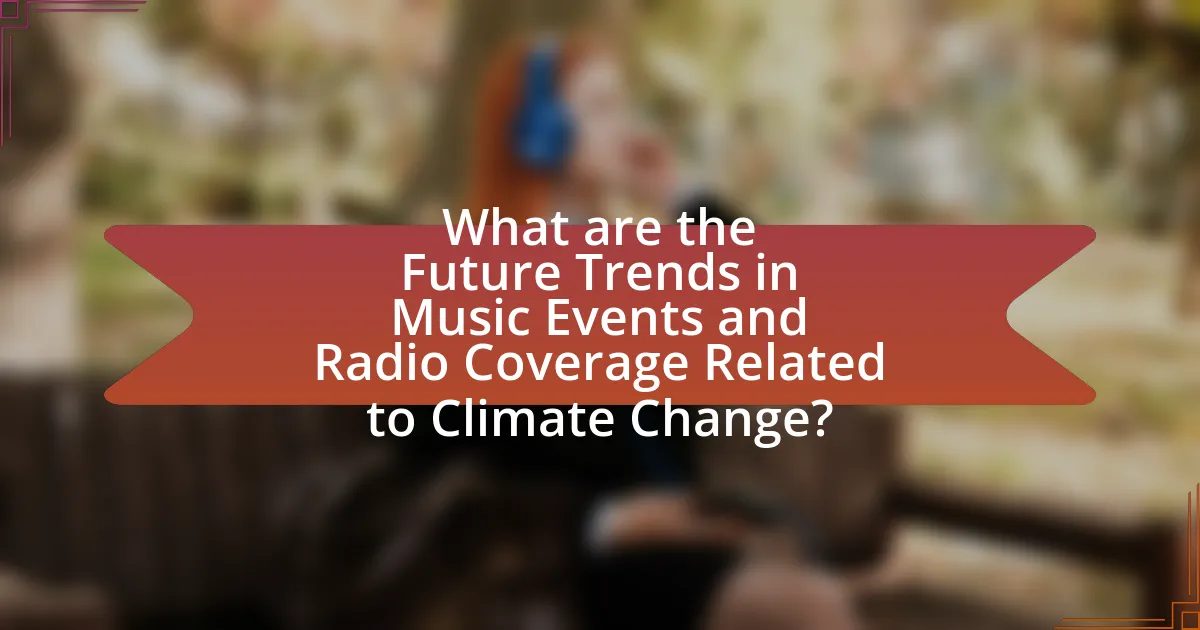
What are the Future Trends in Music Events and Radio Coverage Related to Climate Change?
Future trends in music events and radio coverage related to climate change include increased integration of sustainability practices and a focus on climate awareness. Music festivals are adopting eco-friendly measures such as zero-waste initiatives, renewable energy sources, and carbon offset programs to minimize their environmental impact. For instance, major festivals like Glastonbury have committed to becoming carbon neutral by 2030.
In radio coverage, there is a growing emphasis on broadcasting climate-related content, with stations dedicating segments to environmental issues and featuring artists who advocate for climate action. Research indicates that audiences are increasingly interested in how artists address climate change in their work, leading to more collaborations between musicians and environmental organizations. This trend reflects a broader societal shift towards sustainability and climate consciousness in the arts.
How might the evolution of music events change in response to ongoing climate challenges?
The evolution of music events will increasingly prioritize sustainability and environmental responsibility in response to ongoing climate challenges. Organizers are likely to adopt eco-friendly practices, such as utilizing renewable energy sources, reducing waste through digital ticketing, and implementing carbon offset programs. For instance, major festivals like Glastonbury have already begun to incorporate solar power and promote recycling initiatives, reflecting a broader trend in the industry. Additionally, the rise of virtual events, accelerated by the COVID-19 pandemic, offers a lower carbon footprint alternative, allowing audiences to engage without the environmental impact of travel. This shift towards sustainability not only addresses climate concerns but also aligns with the growing consumer demand for environmentally conscious practices in the entertainment sector.
What role will virtual events play in the future of music amidst climate change?
Virtual events will play a crucial role in the future of music amidst climate change by providing sustainable alternatives to traditional live performances. As climate change leads to increased weather disruptions and environmental concerns, virtual events eliminate the need for travel and large physical gatherings, significantly reducing carbon footprints. For instance, a study by the International Energy Agency indicates that transportation accounts for about 24% of global CO2 emissions, highlighting the environmental benefits of virtual formats. Additionally, virtual events can reach a global audience without the logistical challenges posed by climate-related issues, ensuring that music remains accessible and inclusive.
How can partnerships between music events and environmental organizations shape future practices?
Partnerships between music events and environmental organizations can significantly shape future practices by promoting sustainable event management and raising awareness about climate issues. These collaborations can lead to the implementation of eco-friendly initiatives, such as waste reduction, carbon offsetting, and the use of renewable energy sources at events. For instance, the 2019 Coachella Valley Music and Arts Festival partnered with environmental groups to reduce plastic waste, resulting in a 20% decrease in single-use plastics compared to previous years. Such partnerships not only enhance the environmental responsibility of music events but also engage audiences in climate action, fostering a culture of sustainability within the music industry.
What best practices can be implemented for sustainable music events and effective radio coverage?
Implementing best practices for sustainable music events and effective radio coverage includes utilizing renewable energy sources, minimizing waste, and promoting local talent. Renewable energy, such as solar or wind power, can significantly reduce the carbon footprint of events; for instance, the 2019 Coachella Valley Music and Arts Festival used solar panels to power stages, demonstrating a commitment to sustainability. Minimizing waste involves strategies like digital ticketing and reusable materials, which can decrease landfill contributions; the 2020 Glastonbury Festival aimed for zero waste by encouraging recycling and composting. Promoting local talent not only supports the community but also reduces transportation emissions associated with bringing in artists from afar. Effective radio coverage can be achieved by using digital platforms to reach wider audiences and reduce the need for physical infrastructure, as seen with many stations transitioning to online streaming. These practices collectively contribute to a more sustainable approach to music events while enhancing radio coverage.
What strategies can event organizers adopt to minimize their carbon footprint?
Event organizers can minimize their carbon footprint by implementing sustainable practices such as utilizing renewable energy sources, reducing waste through recycling and composting, and promoting eco-friendly transportation options for attendees. For instance, using solar panels or wind energy can significantly lower greenhouse gas emissions associated with energy consumption at events. Additionally, according to a study by the Green Events and Innovations Conference, events that incorporate waste reduction strategies can decrease waste by up to 50%, thereby minimizing landfill contributions. Furthermore, encouraging carpooling, public transport, or electric vehicle use among participants can reduce the carbon emissions linked to travel, which is often a major contributor to an event’s overall footprint.
How can radio stations promote sustainability in their programming and event coverage?
Radio stations can promote sustainability in their programming and event coverage by integrating environmental themes into their content and supporting eco-friendly initiatives. For instance, they can feature interviews with sustainability experts, highlight local green events, and provide information on how listeners can reduce their carbon footprint. Additionally, radio stations can partner with organizations focused on environmental conservation, thereby amplifying their message through community engagement. Research indicates that media exposure to sustainability topics can significantly influence public awareness and behavior, as seen in studies conducted by the Yale Program on Climate Change Communication, which found that increased media coverage of climate issues correlates with greater public concern and action.
